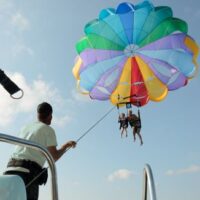Who is Liable for Parasailing Accidents?

Florida is one of the most popular destinations in the country for parasailing, attracting thousands of tourists every year. With its sunny skies, warm waters, and scenic views, parasailing can be the perfect way to enjoy a vacation. But behind the thrill of soaring hundreds of feet above the ocean is a dangerous reality. Parasailing accidents can result in catastrophic injuries or even death, leaving families searching for answers about who is responsible.
The question of liability in parasailing cases is complex. Operators must follow strict state regulations, and federal maritime laws almost always apply depending on where the accident occurs. Additionally, rental companies and vessel owners play a role in passenger safety. Understanding how these rules intersect is essential for injured victims seeking compensation.
Parasailing Risks in Florida
Parasailing combines a parachute-like canopy (parasail) with a harness attached to a towline connected to a boat. While it looks simple, multiple hazards can make the activity dangerous. Equipment failure, such as a snapped towline, torn harness, or malfunctioning winch, is one of the leading causes of parasailing accidents. Adverse weather, including strong winds or lightning, can also create unsafe flying conditions.
Other risks include inexperienced and negligent operators, inadequate safety briefings, and overcrowded beaches or waterways that increase the likelihood of collisions with other vessels or fixed structures. When accidents occur at high altitudes or over open water, the results can be catastrophic.
Florida’s Parasailing Regulations
In response to years of serious parasailing accidents, Florida enacted the White-Miskell Act (Fla. Stat. § 327.375), which sets standards for parasailing operators. Under this law, commercial parasail operators must:
- Carry a minimum amount of liability insurance.
- Maintain weather monitoring equipment onboard.
- Cease operations under hazardous weather conditions, including sustained winds over 20 mph, rain, lightning, or forecasts for severe weather.
- Equip vessels with appropriate safety gear such as radios and life jackets.
- Ensure that towlines, harnesses, and canopies are regularly inspected and maintained.
If an operator fails to follow these regulations, they can be held liable for resulting injuries.
Federal Maritime Law Considerations
While Florida law governs parasailing operations close to shore, many incidents occur over navigable waters that fall under federal maritime jurisdiction. Under 28 U.S.C. § 1333, federal courts have authority over maritime claims, which means victims will in almost 100% of injury cases need to pursue cases under general maritime law.
Federal maritime law imposes a duty of “reasonable care under the circumstances” for vessel operators, including parasailing boats. This duty requires monitoring weather conditions, providing seaworthy vessels, and ensuring that equipment is safe for passenger use. The Limitation of Liability Act (46 U.S.C. § 30523) may also come into play, as vessel owners often attempt to cap damages to the value of the boat after the accident. Only attorneys experienced in maritime law know how to challenge such defenses which attempt to limit your recovery after a parasailing incident. The damages and injuries in parasailing accidents are most often catastrophic, and that is why the insurers of these operations try to limit your recovery to the mere worth of the parasailing vessel—which is usually not much.
Determining Liability in Parasailing Accidents
Liability in parasailing accidents often depends on multiple parties. Common defendants include:
- Parasailing operators who ignore weather advisories, overload equipment, or fail to provide proper safety briefings.
- Boat owners who provide unseaworthy vessels or defective equipment.
- Equipment manufacturers, if a defective harness, towline, or canopy contributed to the accident.
- Rental companies that fail to adequately vet or train operators.
- Other vessel owners who interact with the parasailing vessel.
Because of this web of responsibility, parasailing claims require careful investigation into who made the decisions that led to the accident and whether state or federal law applies.
Passenger Rights After a Parasailing Accident
Victims of parasailing accidents can pursue compensation for medical bills, lost wages, pain and suffering, and long-term disabilities. In cases of fatal accidents, surviving family members may file wrongful death claims. Evidence such as maintenance logs, weather reports, witness testimony, and Coast Guard investigation findings can all strengthen a case.
Passengers should also know that cruise lines and resorts that contract with parasailing operators may share liability if they promote unsafe excursions. Courts have held travel providers accountable when they fail to screen vendors or warn passengers of known risks; however, it is absolutely critical to hire an experienced long-time maritime attorney who has handled this highly specialized type of case.
Challenges in Filing a Claim
Parasailing claims often involve forum selection clauses that dictate where lawsuits must be filed and impose short deadlines, sometimes as little as one year. Additionally, defenses such as assumption of risk or liability waivers are frequently raised by operators. While waivers may complicate a case, they do not absolve operators of gross negligence or violations of safety statutes, and there are arguments against waivers if the attorney you choose has the experience to fight them.
This is why it is critical to consult with an attorney who understands both Florida’s boating regulations and federal maritime law.
Contact Frank D. Butler, PA. and www.888BoatLaw.com
Our team of maritime attorneys has seen firsthand how devastating parasailing accidents can be for victims and their families. With decades of experience in Florida and federal maritime law, we know how to prove the causes of these accidents, hold negligent operators accountable, and fight for the compensation injured passengers deserve.
If you or a loved one was harmed in a parasailing accident, you need an experienced Florida parasailing accident lawyer to help you protect your rights and guide you through the legal process. This is not a time to hire an auto accident law firm who has never handled the intricacies of the law applicable to this type of claim.
Sources:
Florida Statutes § 327.375 – White-Miskell Act
28 U.S.C. § 1333 – Admiralty, maritime, and prize cases
